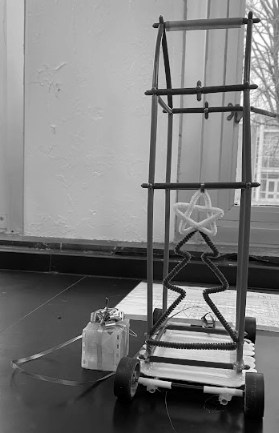North Harford alumna’s future in chemical engineering; Following the path of aerospace science
January 18, 2022
North Harford Alumna Alexis Bultman is currently in school for chemical engineering and looking forward to working in the aerospace industry. Bultman’s interest in chemistry has sparked an interest into building and creating things.
Graduating high school with the class of 2020, the college sophomore had found an interest in building and chemistry. Bultman said,“I found that I really like chemistry” from teacher Christine Jestel. Bultman decided to combine the two ideas and start looking into chemical engineering.
“Chemical engineering is the branch of engineering that deals with chemical production and the manufacture of products through chemical processes,” says Live science. This includes “designing equipment, systems and processes for refining raw materials and for mixing, compounding, and processing chemicals to make valuable products.”
Currently enrolled at UMBC (University of Maryland, Baltimore County), Bultman said she has an interest in the field of the aerospace industry. “I’ve always liked the aerospace industry so I’m hoping I can build anything that flies I’ve always liked like jets and rockets.”
Chemical engineering has industries that you can specialize in like aerospace, health and safety, human resources, nuclear chemistry, biotechnology, and more according to the American Chemical Society.
The aerospace industry “is engaged in the research, development, and manufacture of flight vehicles,” says Britannica. This can include things “like design[ing] primarily aircraft, spacecraft, satellites, and missiles. Aerospace engineers are employed in industries whose workers design or build aircraft, missiles, systems for national defense, or spacecraft,” says the bureau of labor statistics.
Bultman says, “I know with chemistry in general there’s a lot of different components to it.” Bultman thinks taking it from a high school level and bringing it up to a college level is a very different level. “[It was] a very humbling experience. It’s definitely [something] you can get through.” Bulman discusses how she has to wake up at early hours of the morning and has classes all day long. Bultman discusses how in her current classes she does lots of labs and distillation columns and how they “upscale what labs do and [are] making up [a] bigger arc system.”
Chemical engineering isn’t just limited to just one specific path but there are a multitude of different areas you apply that knowledge to. Bultman is currently in a legal class but states that “especially if you get an internship, you can pretty much work anywhere with the chemical engineering degree.” “There is high demand for chemical engineers across a variety of industries” says the University of Texas.











